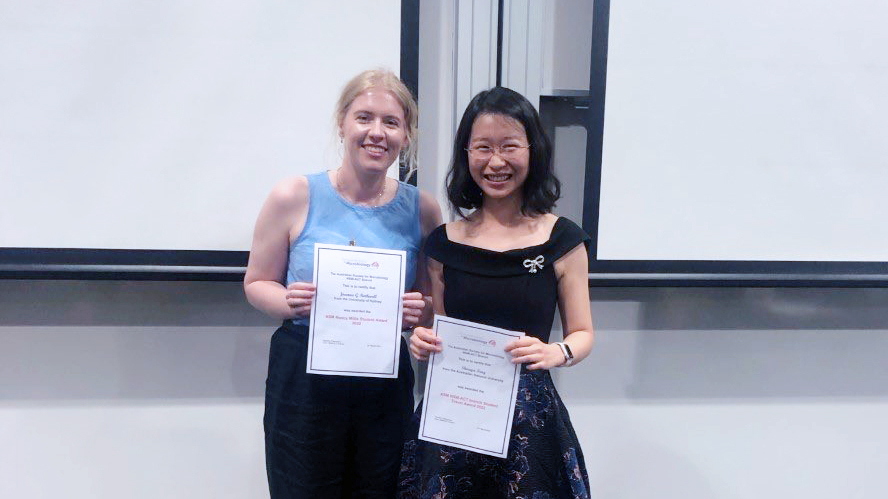JCSMR student won travel award for premier conference on microbiology

JCSMR PhD student Shouya Feng will attend and present at The Australian Society for Microbiology (ASM) Annual National Meeting in July, fully funded.
At this year's ASM Student Travel Awards Night, six finalists from The University of Sydney, The University of New South Wales, and The Australian National University competed for two ASM awards by giving an oral presentation on their research.
In the end, Shouya won the ASM NSW-ACT Branch Student Travel Award. The other award, the ASM Nancy Millis Student Award, went to Joanna Rothwell from the University of Sydney. The awards will cover their attendance at the Meeting.
"I felt honoured to receive this award," said Shouya, "It means a lot to me as it's a symbol of acceptance of our work on antimicrobial proteins by experts in microbiology."
Microbiology meets immunology
A fourth-year PhD student, Shouya seeks a better understanding of how the innate immune response recognises and kills pathogens.
To her, the fact that she presented her research with a unique perspective from both immunology and microbiology may have made her stand out amongst others.
"My presentation was about my PhD work over the past three years and a half," she said, and it led the audience into a microscopic battlefield.
Specifically, she has been investigating the bacterium Francisella novicida, a subspecies of one of the most infectious pathogenic bacteria called F. tularensis.
Due to its capability of causing the infectious disease tularemia (also known as "rabbit fever"), F. tularensis has long been considered a potential bioterror weapon.
Nevertheless, Shouya and labmates found that some members of the protein family known as guanylate-binding proteins (GBPs) can selectively target F. novicida, bind to them, and tear the bacteria apart.
As a result of bacterial membrane rupture, molecules inside the bacteria are released and activate inflammasome, an innate immune signalling complex crucial for clearing the infection.
By examining the biomolecular mechanism underlying this process, the team open up a possible avenue for developing highly selective antimicrobial peptides against different pathogens.
"The prospect of translating basic research from the bench to the bedside is an exciting adventure," said Shouya.
Wrapping up a long journey
Last week, Shouya completed presenting her PhD Exiting Seminar to the School.
Approaching the end of her PhD program, she said she would "definitely miss" all the seminar series and presentations where she shared her work and received valuable feedback.
For years, the camaraderie among peers and ideas exchanged have supported Shouya in many ways and inspired her to be a better scientist.
"The most memorable part of my PhD journey is all those times in the tissue culture room working with my lab mates," Shouya said.
"The work is intense but much more enjoyable with friends around and talking about life."
"The School has a wealth of resources and stellar professional and academic staff to help your research endeavours," said Shouya when asked for advice for students who are about to start their own PhD journeys.
"Just network with everyone at all levels within each division!"
